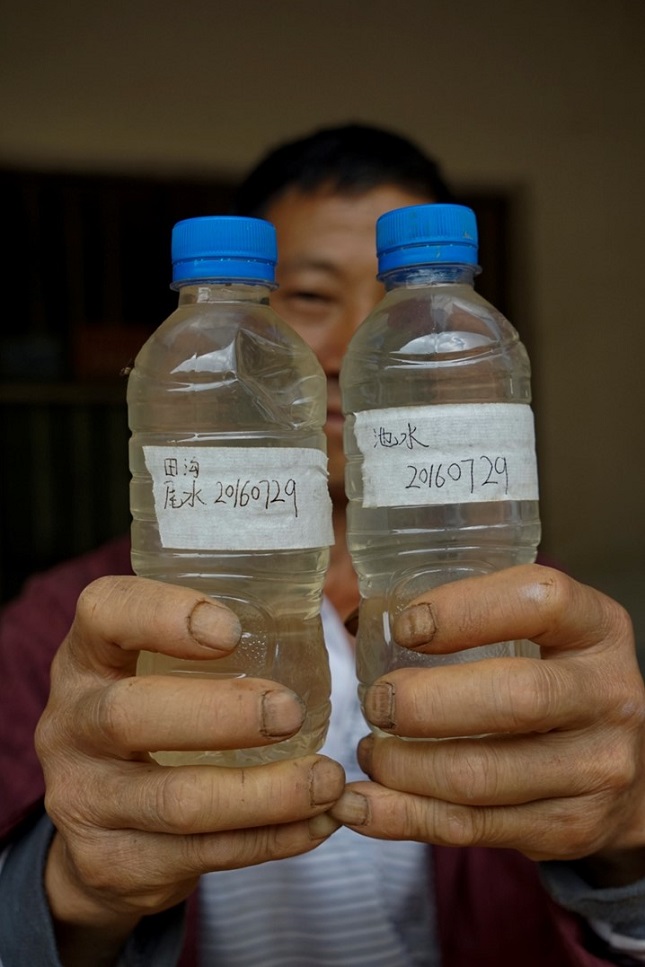Home \ Project News \ Worn Hands of Rural Farmers’ Hard Work
Such are the hands of a farmer, broken nails, fingers covered with visible scars. At first glance one would think they have never been washed but that is not the case, the hands have seen a lot of hard work throughout the years. These are common hands in the countryside. I cannot imagine how long these hands have suffered loads of hard work day in and day out. Raising my eyes I saw a calm and happy smile behind the owner.
Uncle Huang collected water samples
Huang Shu, the owner of these hands, is Piloting Carbon Financing Development for Community Driven Climate Smart Agriculture in Yunnan” Project , a man of about 50 years. He has been with the project since 2014.
The main objective of the project is to mobilize farmers to use the new “Rice Precise Quantitative Planting Technology” which involves wet and dry cycles where the amount of water in the rice paddy is alternated. This avoid the roots to decompose due to lack of oxygen. The technology also involves spacing the plants and planting them when they are still small, about 15cm. This is an experimental project that might influence the future way of growing rice. We look forward to develop furthera reliable ways to reduce agricultural production costs while increasing rice production, reducing methane emissions and promoting environmental-friendly agricultural production .
The villagers had never heard about this technology before the project started and they were a little skeptical. Huang Shu was the first to accept the program and willing to try it out. I asked him why he decided to try and he answered that a village should always have someone who stands up and go forward to try out new things. I then asked if he was not worried that his rice production would be affected negatively, but he said that his family had enough to eat until the following year. Huang Shu is one example of many farmers who dare to try new ways in order to increase production and protect the environment.
Huang Shu also became a pioneer in another project, a “rice tail water treatment project” which successfully was implemented in his village. He was the first farmer to offer the project the experimental field where the project should be set up. This meant that his field could not be used for cultivation and no crops could be planted. He said that although he did not fully understand everything about the treatment pool he knew that the project was aimed at reducing pollution caused by the tail water running into the Niulan River - and to improve the agricultural planting technology. He felt that it was important for many people who lived in this village. He was not only willing to give out his own land, but also to voluntarily help the project in weekly sampling of water from the pool.
In my past work experience, I have found out that direct economic growth is undoubtedly an effective way of stimulating farmers' participation in project activities. However, when farmers think that there is a certain risk or a contradiction of interests in certain project activities it is hard to mobilize them. This is also caused by many experimental projects in rural areas which do not produce positive results or which fail to continue promoting the main purpose.
Pproject introduction:
Fortunately in Yunnan Province, Xundian County, Changjiaba village, we encountered a person such as Huang Shu who is willing to take risks at the expense of his family and his livelihood. He accepted our program of tail water sampling with both his hands for the sake of improving rural environmental protection. He accepted the program and fulfilled the project’s objectives of developing rural work and improving rural environmental protection.”
This case story comes from Yunnan Xundian Paddy Tail Water Treatment Project .The project is supported by National Geographic Air and Water Conservation Fund. The project introduced ecological paddy water treatment methods developed by Environment and Resources Institute of Yunnan Provincial Academy of Agricultural. The project adopts ecological purification method to purify the paddy tail water and recycle it, reducing the paddy fields tail water pollution to Niu Lang River and Dianchi Lake.
This project is funded by National Geographic Air and Water Conservation Fund.
Content in this article reflects only the views of the authors and not those of the funder.